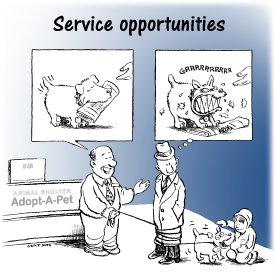|
newsletter — December 28, 2014
Extracurricular Activities, Part 2
Perfect complements to the coursework in your student's resumé
by Diane Speed
 Extracurriculars are important for a host of reasons. For one thing, the activities your child participates in as a highschooler can be life-altering, leading to the discovery of new and unexpected interests, even passions. They can also, of course, be a real differentiator on college applications, not only opening doors at selective schools, but leading to merit scholarships and more. Extracurriculars are important for a host of reasons. For one thing, the activities your child participates in as a highschooler can be life-altering, leading to the discovery of new and unexpected interests, even passions. They can also, of course, be a real differentiator on college applications, not only opening doors at selective schools, but leading to merit scholarships and more.
Last summer we published Part 1 of this survey of ideas for extracurricular activities. We shared ideas for tapping into adult opportunities in your community — e.g., through internships, part-time jobs, and military-affiliated groups. Here in Part 2 we'll discuss sports, debate & government, science & technology, and community service.
Debate & government
Teens love to argue. Getting involved in a forensics team is a great way to take that proclivity and put it to good use. Arguing a point is useless unless it's backed up by facts and presented persuasively. By joining a forensics team, teens learn how to conduct research, frame arguments, and articulate and advocate a point of view.
Parents can easily organize a local debate group, especially those with familiarity in the law, government, rhetoric, etc. But even if you don't have training in those areas, resources exist to support local efforts.
Affordable do-it-yourself approach
Here is a nice, affordable debate course created by Ray Engel, a homeschooling father of six children from Salem, Oregon. He writes, "A big part of our homeschool, high-school program has been Team Policy Debate. I have been teaching and coaching Team Policy Debate for over a dozen years." — Ray's Introduction to Debate: An On-Line Downloadable Course is a complete 11-week introduction with over 10 hours of video instruction in more than 30 lectures. It also includes a complete set of course lecture notes and resource materials and costs only a few dollars.
https://ccnwdebate.org/class-home-page.htm
Although parents can readily form local debate groups with just a few students, national organizations exist to provide a platform for teens to learn about current events, political organizations, and humanitarian issues, and use their knowledge to compete nationally. Here are a few that homeschoolers can join:
Future Problem Solvers (FPS)
FPS is an organization that provides creative problem solving challenges in the form of a curriculum and hosts competitions each year. The program consists of explorations in global issues, such as clean water or human trafficking, community issues in your state or city, and team initiatives using art and writing. Schools and individuals in grades 4-12 from across the nation participate in FPS, and the organization welcomes homeschoolers.
http://www.fpspi.org
Mock Trial
Mock Trial is an organization dedicated to "promoting an understanding and appreciation of the American judicial system through academic competitions and other endeavors for students." Each year they hold a national competition over Mother's Day Weekend in a different state. To participate at nationals, each state, territory or country is required to pay a membership fee. The fee is $250 and is due by January 15th. This membership fee is separate and in addition to a team's $500 tournament registration fee. To find a coordinator for Mock Trial in your state, use this link and choose State Coordinators from the menu on the left:
https://www.nationalmocktrial.org/about/general-information/
Model United Nations
Model United Nations is a simulation of the UN General Assembly and other multilateral bodies. Teams exist on the high-school and collegiate level. In Model UN, students act as ambassadors and debate current issues. They make speeches, prepare draft resolutions, negotiate with allies and adversaries, resolve conflicts, and navigate the Model UN conference rules of procedure – all in an effort to resolve problems. Conferences are held throughout the school year at colleges and universities across the nation and around the world. Before the conference, students research an issue that their committee will address such as peace and security, human rights, the environment, food and hunger, economic development, and globalization. Model UN welcomes homeschooled teams. Use the link below and choose: Start a Model UN Club.
https://www.unausa.org/global-classrooms-model-un/how-to-participate/getting-started
— Or pick up this book: Model UN Handbook by Greg Hodgin. And for more information about how to start a Model UN, try this link:
https://suite.io/michael-streich/1c8k2nv
Model Congress
Model Congress gives high-school and college students insight into the workings of government. Students learn researching skills, debate, and advocacy. Students discuss and debate issues in mock congressional committees such as Foreign Affairs, Armed Services, Judiciary, and Ways and Means. Both houses of Congress are represented in Model Congress's simulation, as are several dozen different committees, each charged with two or three specific issues such as revising the Patriot Act, Campaign Finance Reform, alternative fuels, and relations with the EU. Simulations or conferences are few, although the circuit has been expanding. They are usually hosted by top-tier universities such as Harvard, Yale, and Princeton. Harvard University hosts yearly Model Congresses in Paris, San Francisco, and Asia. High schools attending the conference are public, private, and parochial. Here is a link for this year's Model Congress at Yale:
https://yalemodelcongress.org/
And for more information about how to start a Model Congress, try this link:
https://suite.io/michael-streich/1c8k2nv
National Forensics League (NFL)
The National Forensics League hosts many regional conferences every year in every state. In addition to debate competitions, they offer Model Congresses. These one-day competitions enable students new to Model Congress the chance to gain experience. The NFL Model Congresses are simpler than those hosted by Ivy League institutions: students participate in political debate using simplified parliamentary procedures. Use the link below to find local competitions. An additional benefit: they are more affordable as they have lower registration fees than those hosted by the Ivies.
https://www.speechanddebate.org/nationals
 Science & technology Science & technology
For students interested in STEM (science, technology, engineering, and math), there are many national organizations that invite homeschoolers to form their own groups and to participate in state-wide and national competitions.
Destination Imagination (DI)
DI provides challenges to teams of students (elementary through high-school ages) — challenges that require problem solving, cooperation, and the incorporation of art and STEM. DI welcomes homeschooled teams. Use the link below and from the menu, choose Get Involved – Start a Team:
http://www.idodi.org/
FIRST (For Inspiration and Recognition of Science and Technology)
FIRST provides support to high school robotics teams. Contact high schools in your area that host First Robotics (FRC) teams and inquire whether they will accept homeschoolers. Many public schools welcome homeschoolers as they usually are great contributors to the team. Alternatively, use the First Tech Challenge (FTC), a slightly less technical and less-costly segment of FIRST, and start a homeschooled team.
http://www.usfirst.org/
Invention Convention
Invention Convention is a program that seeks to provide students in grades K-8 with a meaningful opportunity to solve real-life problems by using their creativity to build machines. The convention provides an opportunity for student inventors to participate in a friendly competition and to share their ideas with other students as well as adult inventors, engineers, patent attorneys, and other professionals. Look for information in your state.
Maker Movement
Students with a passion to create or program machines can join the maker movement. Most makers are amateurs or students, but they are proving to be a source of innovation — creating new products, becoming entrepreneurs and starting companies, and impacting innovation in manufacturing, engineering, industrial design, hardware technology, and education. Look for Maker Faires in your area or connect nationally.
https://makerfaire.com/
Or find a local MakerSpace, or even create your own. MakerSpaces are:
"... community centers with tools. Makerspaces combine manufacturing equipment, community, and education for the purposes of enabling community members to design, prototype and create manufactured works that wouldn't be possible to create with the resources available to individuals working alone. These spaces can take the form of loosely-organized individuals sharing space and tools, for-profit companies, non-profit corporations, organizations affiliated with or hosted within schools, universities or libraries, and more. All are united in the purpose of providing access to equipment, community, and education, and all are unique in exactly how they are arranged to fit the purposes of the community they serve. Makerspaces represent the democratization of design, engineering, fabrication, and education. They are a fairly new phenomenon, but are beginning to produce projects with significant national impacts."
https://makerspace.com/
Science Olympiad (SO)
Science Olympiad is a national organization that provides state and national science competitions for the middle-school and high-school aged students. Throughout the school year, students research, explore, build, and test topics or projects outlined by SO. Areas of exploration include biology, ecology, physics, engineering, forensics, and chemistry. In the spring, teams gather on the state level, and compete in a range of tests and activities predetermined by SO. A few teams go on to compete nationally. SO welcomes homeschooled teams. Use the link and choose Start a Team from the menu.
http://soinc.org/
 Sports Sports
For many homeschoolers, finding opportunities to compete or train in sports is a challenge. Many schools will not open their teams to non-matriculating students. If you have a sporty kid who wants to play or train, consider the following:
Private sports training
Sports training may be available through private organizations or clubs; these include solo endeavors like golf, tennis, martial arts, fencing, archery, gymnastics, horseback riding, and cycling, as well as team sports like bowling, swimming, and rowing. Many of these sports have state and national competitions where your student can compete. Moreover, vendors who offer training in these disciplines are often delighted to plan classes or training sessions solely for homeschooled students — and may even give discounts for off-peak hours.
Coordinate your own team sport
It is not difficult to coordinate a team sports activity yourself, but it does take planning. In our area, parents have pulled together flag football, basketball, and softball. If you want a team sport for homeschoolers in your area, consider purchasing equipment and securing permits, insurance, and venues.
 Community service Community service
Scholarship committees take note of service, and for good reason. Teens can become very self-absorbed, dedicating vast amounts of time and energy to achieving their own immediate desires. Helping your teen find outlets for giving to others will develop many important character traits: compassion, humility, kindness, a sense of higher purpose, love of service. So community service should be an essential part of your student's resumé; it demonstrates leadership, maturity, time management skills, and responsibility. To adolescents, the experience can be so valuable that many school districts in the nation require teens to complete at least 40 hours of service in order to graduate. Many teens draw on their service experience for the content of their college admissions essays. A few links you may find useful:
While there are national organizations looking for volunteers, you can find opportunities right in your community: churches, the YMCA, local charities, shelters both for the needy and for animals, libraries, hospitals, and schools often are short-handed in pursuing their missions.
Create your own service initiative. Teens can spearhead their own volunteer projects and donate their skills or talents in dozens of ways — putting together a performance for charity, sharing artistic skills with needy kids, organizing a coat or food drive, participating in efforts after a natural disaster; the possibilities are endless.
Begin simply by asking your teen whom he or she would like to help — animals? children? veterans? the elderly? Then have your student research charitable organizations and select one to benefit. After that, help your student create a plan for volunteering his or her skills and talents to support the charity.
Here are a few resources to consider when creating a plan for volunteerism:
Volunteer Match
Volunteer Match is a search engine for service opportunities in your area sorted by need:
http://www.volunteermatch.org/
Presidential Volunteer Service Award
As a way to certify substantial volunteer hours for students, your homeschool group can become a Certifying Organization for the Presidential Volunteer Service Award. This award validates the time and effort your student dedicates to volunteerism. For award eligibility, see About the Award from the menu on the left hand side of the landing page. https://www.presidentialserviceawards.gov/tg/pvsainfo/dspMeetOurPartners.cfm
* * *
Time spent on extracurricular activities may be as important as time spent on academics. Using extracurricular activities in your community or tapping into national organizations to broaden your student's experience not only provides social interaction with peers and real learning and enrichment, it shows that your homeschooled student is part of a larger community. Equally important, these extra-curricular activities provide a glimpse into your student's interests — and that insight can be the factor that sets your student apart as colleges sort through thousands of applications.
On the Common Application, there are ten slots for activities during the high school years. Ideally, you don't want your student to leave any slot blank.
Be sure you make a plan for maximizing the wealth of benefits available through this essential element of your student's academic plan.
* * *
Not on our mailing list? — Adding yourself is easy; just go here.
|
|
|
View all our online courses here.
Eight weeks, in depth, live & online
Twice weekly sessions for two semesters
Twice weekly sessions for two semesters
- March 7, 2020: Beyond the Tour: Getting the most from your college visits
- July 29, 2019: Advocating for oneself, Part 2: College admissions essays & interviews
- May 29, 2019: What our students aren't taught about grammar
- May 16, 2017: Advocating for oneself (Part 1 of 2)
- July 20, 2016: The development of adolescent minds
- December 24, 2015: The appeal of videogames—and the hazards they bring
- August 16, 2015: Three skills your student needs to develop before college (Part 1 of 3)
- July 3, 2015: How literature is now taught in college—and why enrollment in literature courses is in steep decline
- June 1, 2015: Teaching Shakespeare to your kids: What I've learned
- Dec 28, 2014: Extracurricular activities, Part 2
- July 27, 2014: Levels of annotation —
Annotating the text, Part 2
- July 15, 2014: Extracurricular activities, Part 1
- July 2, 2014: Teens need to be together… An innovative solution
- June 9, 2014: The college admissions racket — Getting things into perspective
- June 2, 2014: Building good study habits
— Annotating the text, Part 1
- April 8, 2014: Building good study habits
— Close reading
- March 18, 2014: Why all our students must study Shakespeare
- Feb 25, 2014: Standardized tests, Part 2
- Feb 18, 2014: Standardized tests, Part 1
- Feb 1, 2014: Advanced mathematics
|
|
Shakespeare Intensives
Close reading of Shakespeare
Ten online sessions of 90 minutes
Ten online sessions of 90 minutes
Seven online sessions of 90 minutes
An introduction to Shakespeare's comedy
Eight online sessions of 90 minutes
ONLINE: English Language Arts
— Now open for registration —
Weekly online class
in the essentials of English
 This two-semester course is taught by the author of The Writer's Guide to Grammar. It puts in place skills and knowledge foundational to the study of English and the mastery of clear writing. The weekly class is live and online, and students master all the most important principles of the English language — grammar, usage, punctuation, and more. This two-semester course is taught by the author of The Writer's Guide to Grammar. It puts in place skills and knowledge foundational to the study of English and the mastery of clear writing. The weekly class is live and online, and students master all the most important principles of the English language — grammar, usage, punctuation, and more.
Online Writing
Two semesters of online classes
Two classes per week
Online Literature
Two semesters of online instruction
Training for parents
Now an online series!
This program addresses the principal concerns parents have about homeschooling through high school — curriculum and credits, standardized tests, transcripts and record-keeping, the application process, pursuing scholarships, and more.
Terrific. Full of information. The materials were so thorough. I now have a plan of action. Also, this workshop is inclusive: No matter what type of homeschooler you are, you will understand better how to prepare your student for college and present him or her in the best light.
Mother of two
|
|
![]()